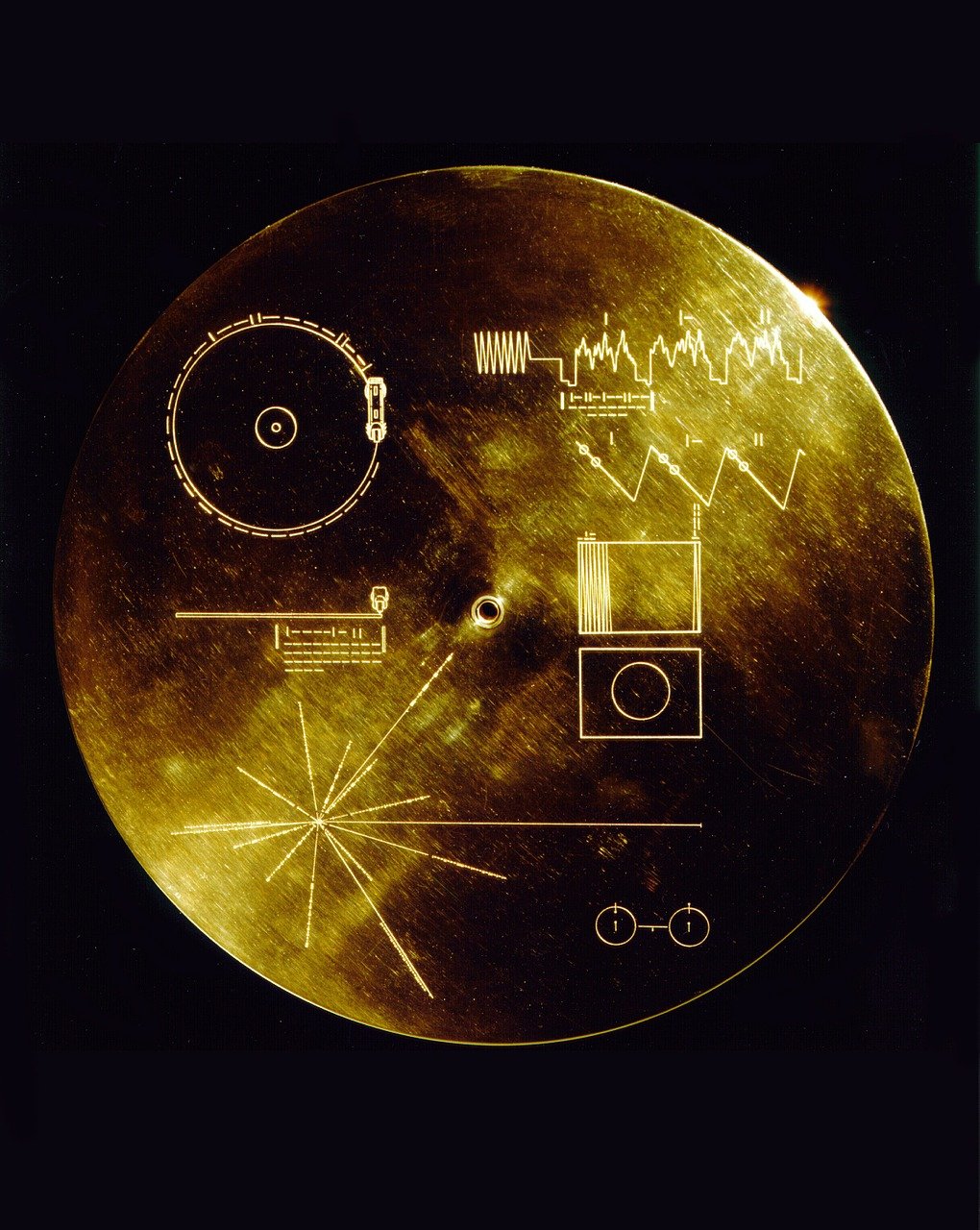
The original golden record carried by the Voyager space craft into space (source: pixabay.com)
As part of the Voyager mission that launched in 1977, a golden record was forged with audio, music, and images to define the planet Earth and its inhabitants to share with other intelligent lifeforms that may come across the spacecraft on its journey into the unknown. (https://voyager.jpl.nasa.gov/mission/spacecraft/)
The Challenge
I was assigned the task to choose only 10 of 27 songs to be included on the Golden Record with my reasoning of choice. Here are my choices:
- Mozart – Queen of the night – Eda Moser Why? It does not make sense to send a representation of Earth sounds without the work of a famous composer such as Mozart.
- Tchakrulo – Choir – Georgia Why? Representation of culture and place (Georgia) and the uniqueness of this form of music.
- Men’s house song – Papua New Guinea Why? Representation of culture and place (Papu New Guinea)
- Morning Star and Devil Bird – Australia Why? Representation of culture (Aborigines) and place (Australia). I also chose this song because it used a unique instrument.
- Navajo Night Chant – America Why? Representation of culture (First Nations people of the Navajo) and place (Southwest United States)
- Melancholy Blues – L Armstrong & His Host Seven Why? Representation of culture (jazz) and place (United States)
- Jaat Kahan Ho – India – Surshri Why? Representation of culture and place (India)
- Iziel je Delyo Hagdutin – Bulgaria Why? Representation of culture and place (Bulgaria)
- El Casacabel-Lorenzo Barcelata & the Mari Why? Representation of culture (Mexican) and place (Mexico)
- Flowing Streams – China Why? Representation of culture (Chinese) and place (China)
Final Thoughts:
As you can see, the main reasons for my choices of music for my golden record playlist were representation. I wanted songs that covered as much of Earth’s diversity as possible which means integrating as many cultures and geographical locations as possible.
Despite how much I enjoy some of the other songs such as, Johnny B Good by Chuck Barry, I tried to distance myself to be fair and unbiased. In the case of Johnny B Good, I had already included a representation for America on my list with Melancholy Blues and I felt that Johnny B Good was not as culturally significant or timeless as the others. To me, it would be like including the latest pop hit which is just not as significant to be a representation of sounds of Earth.
Discovery:
During the process of verifying my understanding of the various tracks I had chosen, I actually discovered that one song may not be as authentic as I had thought. There is actually some controversy around Morning Star and Devil Bird. According to an article published in 2013, the recording of this song that was included on the Voyager golden record may have included instead of Devil song, which was about the dangers of one’s fate, it was of a different song called Moikoi, which was about spirits interacting with each other with malicious intent (Rosen, 2013). I still stand by my choice, but after this new information came to light, it really made me think about representation, the accuracy of representation when chosen by outsiders (the team that chose the original 27 songs for Voyager), and the meanings that music conveys. It is truly another form of text as it carries a message that is not always clear or simple to classify.
I believe that this discovery brings up an interesting aspect of the digitization of information. During my course on Text technologies, I read about digitization, the process of converting information and texts into a digital format (Smith, 1999). Despite the transferring of texts in their various formats to digital form, it may not always be accurate when the ones digitizing the work were not the original writers, composers, poets, musicians…etc. In the context of what can be lost in the process of digitzation for music and song, many argue that how music is listened to can alter it’s meaning and presence. For example, watching a digital version of a movie on your phone creates a much different experience than watching it in the theatre with the intended aspect ratio and surround sound. I would think that digitization is a great way to backup information but it should not always replace the format in which a piece of text was intended.
Reference
Smith, A. (1999). Why digitize? Retrieved June 15, 2019, from Council on Library and Information Resources website: https://www.clir.org/pubs/reports/pub80-smith/pub80-2/
Rosen, R. J. (2013, November 13). Is the Official Description of the Aboriginal Music on the Voyager Records Wrong? The Atlantic. Retrieved from https://www.theatlantic.com/technology/archive/2013/11/is-the-official-description-of-the-aboriginal-music-on-the-voyager-records-wrong/280676/.
